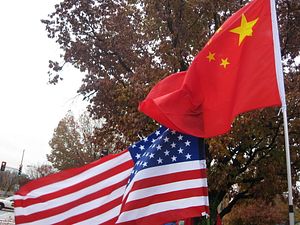By Gedaliah Afterman
 The signing of the Phase One trade agreement in Washington between the United States and China last month was a positive development, but unless it leads to a dramatic change in the bilateral relationship it is unlikely to substantially influence a new global trend that now seems to be in full force.
The signing of the Phase One trade agreement in Washington between the United States and China last month was a positive development, but unless it leads to a dramatic change in the bilateral relationship it is unlikely to substantially influence a new global trend that now seems to be in full force.
The world is now faced not only with the implications of China’s rise to superpower status and its growing economic clout and the challenges this raises, but also with a United States that is pursuing an inconsistent foreign policy and a growing sense of ongoing and increasingly strategic rivalry between the U.S. and China. This new reality is placing many smaller countries in a new and unfamiliar position, having to navigate and promote their own interests while balancing the demands of the two competing superpowers.
The realignment of global and regional actors is extremely dynamic, creating unprecedented threats, risks, and opportunities. As the United States is perceived to be decreasing its involvement in Asia and in the Middle East, regional regimes are increasingly eyeing China as a potential regional game-changer in the spheres of trade, economy, energy, as well as defense and foreign policy.
Viewed from Israel, these developments present opportunities and challenges. Asia’s economic growth and demand for technology and innovation offer access to the world’s most dynamic economic region. On the other hand, Israel has traditionally been oriented toward the United States and Europe, from both an economic and cultural perspective, and therefore needs to develop an understanding of how to effectively engage with Asia. In addition, Israel must balance its growing ties with China with its obligations to the U.S. alliance.
In recent years, China has become substantially more active in the Middle East, including through the Belt and Road Initiative, and this trend is likely to continue. China’s economic engagement with Israel has grown substantially too, including Chinese investments in strategic infrastructure and technology. China has also become more active in promoting Chinese culture and soft power in Israel. These developments have raised sensitivities with the United States and highlighted the need for Israel to develop an independent, long-term strategic policy regarding its relationship with China.
With the global geostrategic landscape changing rapidly, many countries are feeling pressured. In Europe, for example, countries such as Britain, Germany, and Spain are feeling the crunch as the United States actively works to persuade allies to block the involvement of Huawei and other Chinese tech companies in 5G networks.
This phenomenon is relevant not only for technology issues. Many small to medium-sized countries, including Australia, Singapore, Israel, and other countries in Europe, Asia, and the Middle East (particularly in the Gulf), that have a strong connection with the United States are also seeking a closer economic relationship with China. These “stuck in the middle” countries should seek to learn and actively engage with one another. For such smaller powers the evolving challenges of an ongoing state of aggressive competition between the world’s two leading powers are substantial and require astute handling.
But this state of global and regional geopolitical uncertainty creates new opportunities as well. Smaller countries should identify and grasp the new opportunities that this changing landscape presents. Taking a proactive approach, smaller countries should aim to move away from the old divides, and to create new coalitions within and between regions, in particular the Asia-Pacific and the Middle East.
Such new coalitions can take a number of different forms, for example, the establishment of a new ASEAN-Middle East Innovation Forum. This would be a multilateral coalition focused on strengthening relations and cooperation between countries in Southeast Asia and the Middle East by bringing together unique capabilities and technological innovations to deal with the real needs in both regions, including water desalination, food safety, green energy and clean technology, healthcare, education, science and technology.
Such broader cross-regional cooperation could also provide an effective platform for joint promotion of regional and global solutions to transnational problems such as climate change, crises management, people smuggling and immigration, and terrorism. It could also act as a platform to bring together countries that do not normally sit at the same table.
Another way to step out of the familiar boundaries of state-to-state diplomacy could be to engage in city diplomacy – transcending the limitations and constraints of states, and creating agile joint frameworks directly with cities, metropolitans, and provinces. This approach could help in finding quick and effective solutions for pressing needs and interests.
As the competition between the two superpowers seems likely to continue into the foreseeable future, smaller countries need to join forces to develop a greater understanding of the challenges involved and create innovative new forms of cooperation.
Dr Gedaliah Afterman is Head of the Asia Policy Program at the Abba Eban Institute for International Diplomacy at the Interdisciplinary Center Herzliya (Israel). He previously served as an Australian foreign service officer working on Asian regional security issues and a diplomat at the Australian Embassy in Beijing where he focused on issues related to China’s foreign policy, including the Middle East.
No comments:
Post a Comment